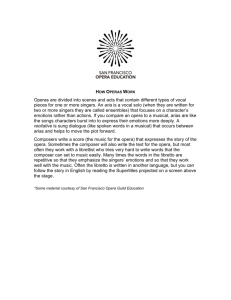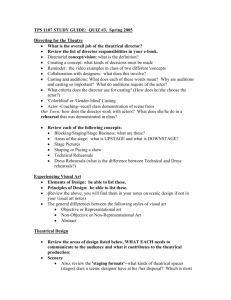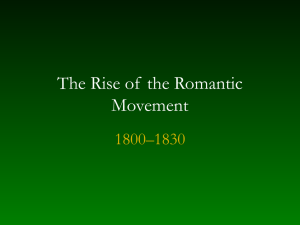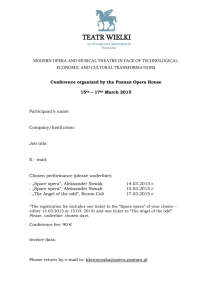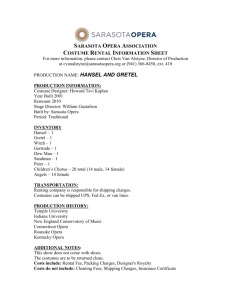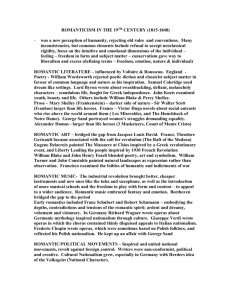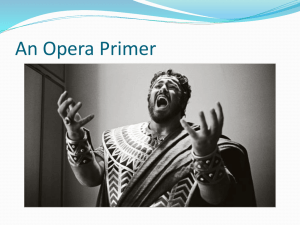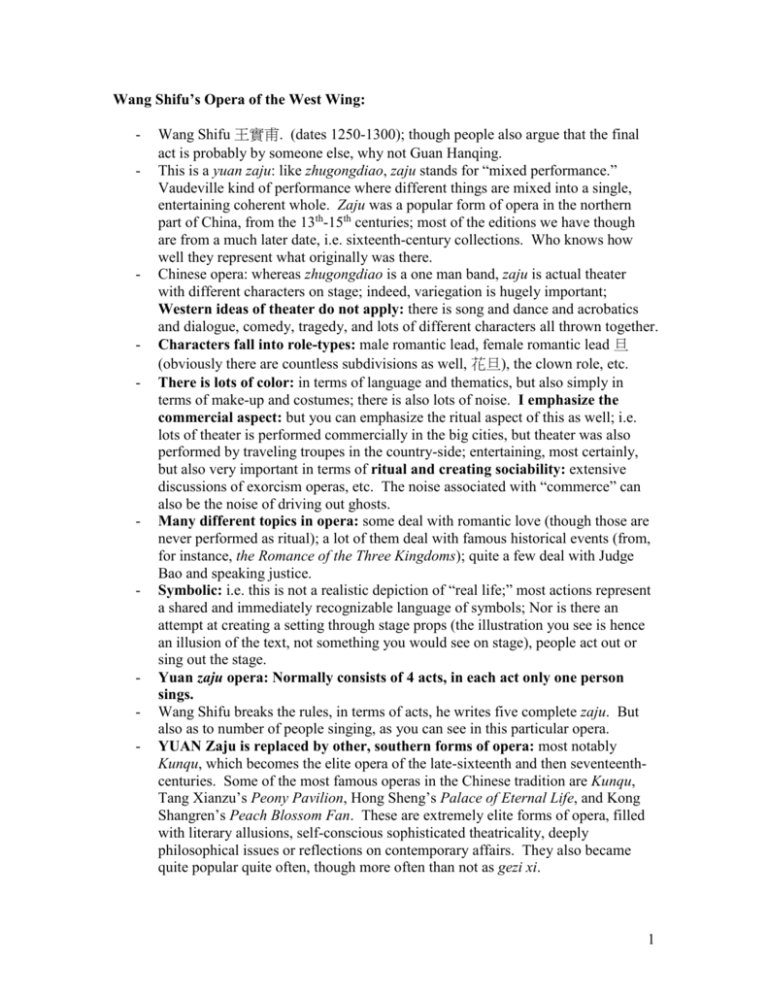
Wang Shifu’s Opera of the West Wing:
-
-
-
-
-
-
Wang Shifu 王實甫. (dates 1250-1300); though people also argue that the final
act is probably by someone else, why not Guan Hanqing.
This is a yuan zaju: like zhugongdiao, zaju stands for “mixed performance.”
Vaudeville kind of performance where different things are mixed into a single,
entertaining coherent whole. Zaju was a popular form of opera in the northern
part of China, from the 13th-15th centuries; most of the editions we have though
are from a much later date, i.e. sixteenth-century collections. Who knows how
well they represent what originally was there.
Chinese opera: whereas zhugongdiao is a one man band, zaju is actual theater
with different characters on stage; indeed, variegation is hugely important;
Western ideas of theater do not apply: there is song and dance and acrobatics
and dialogue, comedy, tragedy, and lots of different characters all thrown together.
Characters fall into role-types: male romantic lead, female romantic lead 旦
(obviously there are countless subdivisions as well, 花旦), the clown role, etc.
There is lots of color: in terms of language and thematics, but also simply in
terms of make-up and costumes; there is also lots of noise. I emphasize the
commercial aspect: but you can emphasize the ritual aspect of this as well; i.e.
lots of theater is performed commercially in the big cities, but theater was also
performed by traveling troupes in the country-side; entertaining, most certainly,
but also very important in terms of ritual and creating sociability: extensive
discussions of exorcism operas, etc. The noise associated with “commerce” can
also be the noise of driving out ghosts.
Many different topics in opera: some deal with romantic love (though those are
never performed as ritual); a lot of them deal with famous historical events (from,
for instance, the Romance of the Three Kingdoms); quite a few deal with Judge
Bao and speaking justice.
Symbolic: i.e. this is not a realistic depiction of “real life;” most actions represent
a shared and immediately recognizable language of symbols; Nor is there an
attempt at creating a setting through stage props (the illustration you see is hence
an illusion of the text, not something you would see on stage), people act out or
sing out the stage.
Yuan zaju opera: Normally consists of 4 acts, in each act only one person
sings.
Wang Shifu breaks the rules, in terms of acts, he writes five complete zaju. But
also as to number of people singing, as you can see in this particular opera.
YUAN Zaju is replaced by other, southern forms of opera: most notably
Kunqu, which becomes the elite opera of the late-sixteenth and then seventeenthcenturies. Some of the most famous operas in the Chinese tradition are Kunqu,
Tang Xianzu’s Peony Pavilion, Hong Sheng’s Palace of Eternal Life, and Kong
Shangren’s Peach Blossom Fan. These are extremely elite forms of opera, filled
with literary allusions, self-conscious sophisticated theatricality, deeply
philosophical issues or reflections on contemporary affairs. They also became
quite popular quite often, though more often than not as gezi xi.
1
-
Southern operas: are much longer, sometimes forty acts or more, would take
days to perform. Usually only single scenes are performed, but operas themselves
are published in their entirety. Operas exist between print and stage.
Relationship between the stage and the page.
CHOICE OF XIXIANGJI:
-
the particular scene deals very nicely with a variety of sounds, the way sounds can
both connect human beings (as in the case of the ospreys), but also keep people
separate (as in the case of the ospreys); so we have the sounds of the zither that
seduce Yingying (or Oriole as she is known here, not an osprey), the sound, as in
the Song of the Pipa makes draw nearer and nearer (actual quote from the page:
she moves closer and close to Master Sheng’s quarters). She then becomes the
“zhiyin” or person who recognizes the sound/soul of the person producing the
sound. Sound also separates: i.e. sound allows a distance between two people,
they are almost there, but not quite, this is what makes for eroticism, seduction
and separation, almost touching, but not quite.
Second Reason for this choice, its popularity: one of the most popular love stories in
Chinese literature; West mentions how in the late Ming alone (1600-1644), over thirty
editions were published.
- Influences all A. following romantic operas (Wang Shifu’s play in particular is one of
the two, maybe three most important operas ever written; Gao Ming’s pipaji and Tang
Xianzu’s Mudan ting), B. but also later novels such as 18th century Hong Lou Meng,
where the main protagonists Jia Baoyu and Lin Daiyu act out their own romance of starcrossed lovers. C. Influences notions of romance and ideals of masculinity and
femininity in general.
- Why so popular? A. quality of its language, which is instead of straightforward
classical, “vernacular” or at least a mix of “elegant poetry” and “vernacular prose.” B.
the quality and elegance of its musical component, its arias. (think of the scene of the
zither as a conduit, language of love) C. the quality of its illustrations
- Its theme of love and sexuality: the play has been famous as an erotic fantasy, close to
pornography. Hong lou meng, Cao Xueqin, quoting from this opera is illicit, forbidden.
- Sexuality is not all that explicit: erotic, but in good taste, there is a quite explicit sex
scene, but even that scene, brief as it is, is quite “tasteful.”
- A. not sexual but erotic: i.e. this is not pornography, this is still acceptable, this is
literature that can be appreciated by elite, well-bred young men and women; porn is porn,
is a world to itself, stays in its category; it is when sexuality instead of just sexual
becomes seductive, precisely because it is beautiful, elegant, indirect, nicely phrased, as
opposed to simply crude and direct that sexuality actually becomes dangerous. The
writing of the play is like Scholar Zhang himself: well-bred, eloquent, tasteful, at times
a bit foppish, witty, with a hint of vernacular vulgarity and playfulness, i.e. the play
seduces the reader just as Zhang seduced Yingying.
- Main point: like so much of Chinese writing, this play is about writing itself; but here
specifically about the seductive qualities of writing. I.e. the erotics of the play is about
2
the seductive qualities of language itself: hence, the perversion of the play, also is about
writing going wrong, writing not being upright.
- Here writing is a perversion of the pure writing of classical language itself (its
vernacularity, its sexual puns, oozing with inappropriateness). This is not vulgar,
straightforward commercial stuff; this is the kind of popular literature that can be
appreciated by the highest echelons of society.
- Transgression lies not simply in that erotic acts take place, but the perversion of
some its sexual politics:
- B. the theme of forbidden love: like Romeo and Juliette, the story of Cui Yingying and
Scholar Zhang goes against one of the major taboos: no parental permission for this
sexual affair. Zhang is a bachelor and has no ties, but Yingying clearly disobeys her
mother’s wishes in terms of sleeping with scholar Zhang; this scene is the pivotal scene
where she finally makes up her mind to sleep with him, despite her mother’s commands.
- C. the theme of the love-struck scholar: the theme of the talented young man who is
completely love-sick for his lover: his love is physically debilitating (illness is the
central metaphor): when you get to those moments where he falls in love, he is
completely stopped in his tracks: His love for the woman, turns him into an
emasculated picture of his former self: the theme of gender and the different kinds of
masculinity presented in this play in general, but Scholar Zhang is a kind of romantic
male, strongly feminine hero is highly attractive in late-imperial literature. Compare
with Yingying zhuan by Yuan Zhen: Masculinity defined by saying no to the
temptation of women: “p. 507, “During the Zhenyuan period, there lived a young man
named Zhang. He was agreeable and refined and good looking, but firm and selfcontained, and capable of no improper act.” “p. 516, Here a Feminine voice: I am alone
in my boudoir, I hear the dripping of the water clock, the incense burns down to ashes,
where are you? Much of this romantic poetry of longing in Song dynasty ci style was
written in a feminine voice; the story of the West-Wing employs this romantic language
of longing associated with the woman, but for the persona of a man.
- Sound and Separation:
Sound here really comes to embody the notion of zhiyin; at first the sound (divorced from
its origin) is not obviously connoted with any meaning, hence the first eight lines all
emphasize what a sound can potentially mean: “hair ornaments” “girdle pedants” “wind
chimes” “golden curtain hooks” Categories: in the first few lines we find that we have
two sounds associated with clothing and ourselves (i.e. feminine accoutrements of dress),
then followed by two architectural, spatial sounds (this already crosses a certain
distance). Note: this is actually noted upon by Jin Shengtan,. What causes sound and
what kind of sound: sound is inevitably associated with movement (i.e. physicality), the
presence of something or someone, even if this is merely the wind. The second poem:
less obviously what the various sounds belong too: 1. Nightbell: sounds at night 2.
Scattered bamboos: 3. Ivory rulers: i.e. rhythmic music keeping time 4. Water-clock:
clepsydra: notions of time passing by.
separation: example one: “bamboo rustling behind the curved balustrade” Most
notably: “there” his longing is limitless.” “here I have understood his
intentions”example two: “I listen again east of the wall.” I.e. overhearing “I hide
myself.” More metaphors: losing what the various sounds belong too: 1. Nightbell:
3
sounds at night 2. Scattered bamboos: 3. Ivory rulers: i.e. rhythmic music keeping
time 4. Water-clock: clepsydra: notions of time passing by.
- separation: example one: “bamboo rustling behind the curved balustrade” Most
notably: “there” his longing is limitless.” “here I have understood his intentions”
example two: “I listen again east of the wall.” I.e. overhearing “I hide myself.”
More metaphors: losing one’s mate, “the shrike goes west and the flying
swallow east” Example X: “there is someone outside the window.” And finally,
a single pane of paper like a mountain standing between them: “it’s just a
single thickness of red paper/and a few wide-apart stiles/but isn’t it the same as
being separated by myriad screens of cloudy mountains? How to find someone to
transmit messages Sto that even if separated by the twelve peaks of Shamanka
Mountaiin, He would already have gone to Gaotang to meet me in his dreams?”
Only wind gets through, light, and sound: “loose shades the wind is light/ lamp
is clear.”
- Isolation: here hide myself, but there is a clear sense of silence and loneliness
here “the night struck bell” “dripping of the clepsydra echoing in the catchpot’s
bronze” etc. Sound and time: these images are repeated on p. 187, “with each
and every word, the watch lengthens, the clepsydra drips for an eternity….” With
each and every sound, my gown grows roomier, my belt looser.” Especially in
the last sentence subject and time: i.e. the direct physical effect of love suffering
and time passing.
Sounds and Meaning:
Beyond language: the whole idea is to move beyond language, direct communication is
too simple; “it’s all told in what’s unspoken” To understand one’s meaning through
sound itself (which is also found in the idea that she does not know what the sound is
at first: this in general of course is the move, i.e. from being caught unaware by sound,
tracing it to the source, then understanding its meaning) Irony: all set to text here that
we read.
Back and Forth:
-
-
These arias are sung by both Yingying and Scholar Zhang: i.e. a duet; not in
harmony, but responding to one another; most notably on pp. 186-7: where we
read a similar dynamic within the lyrics “This is to make her…” “As I give
plaint” “one who loves music” “one moved by feeling.” This back and forth,
ABAB (which itself is an A) is responded to by B: first he gives four more
lines, then follows her response “all the grief of parting and the sorrow of
separation/have turned into this single tune. A student Zhang/ It makes one love
you even more…” (p. 187). I.e. joyful union will take place, but not yet, oh
suffering. Then an actual dialogue.
give example of ABAB, aria, duet: not singing together, but singing to one
another. Use of the zither as a gradual getting closer: again, just as the two
characters get closer and are drawn in, so are we as an audience. Crossing the
4
distance between two lovers, is also the crossing between the stage and the
fictional space of the narrative and the “reality” of the audience watching the play.
Illustration ibid.
5

